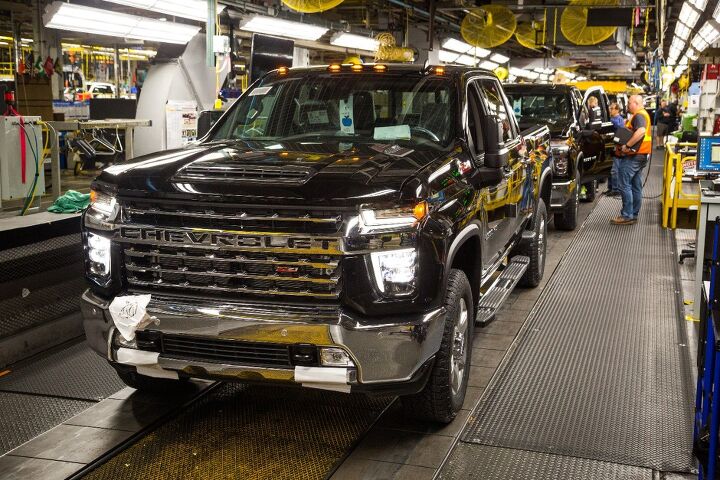Read My Lips: Michigan's Governor Issues a Warning

Auto plants across the U.S. are a beehive of activity as workers (and their bosses) seek to make up for lost time. The two-month coronavirus shutdown drained inventories, yet the virus that sparked the unprecedented closure of workplaces across the nation hasn’t gone away.
As you read yesterday, the ongoing pressures reportedly forced one Detroit-based automaker to take desperate measures just to keep the taps running. So Detroit Three automakers probably reacted with trepidation after hearing the U.S.’s most car-heavy state isn’t afraid to pump the brakes once again.
Michigan Governor Gretchen Whitmer issued a warning yesterday, saying that lockdown measures could return if residents don’t abide by a mask-wearing mandate designed to limit the spread of the novel coronavirus.
“If Michiganders don’t mask up when we go out in public, cases could rise and we could be forced to close down more of our businesses, including auto manufacturing plants that employ thousands,” Whitmer said at a Lansing press conference, per Bloomberg. “A second wave of this virus could be absolutely devastating.”
It’s a scenario that would hit Michigan-based automakers hard in the wallet. The country’s best-selling vehicle, the Ford F-150, is assembled in Dearborn, along with a slew of other high-margin moneymakers assembled throughout the southeastern expanse of the mitten. And Whitmer’s liable to do it if things get bad, if past actions tell us anything.
Following the reopening of businesses and the resumption of auto production, COVID-19 cases predictable rose again, though the case count hasn’t matched the first wave of the virus that swept through Michigan in March. State-level data (graph 2) shows a post-opening bump beginning in late June. New cases on July 15th were the highest recorded since mid-May.
Because things can get tout of hand in a hurry, vigilance and, yes, compliance is necessary to maintain some kind of quasi-normal society and economy. Businesses need to generate revenue, otherwise we’re all pooched.
Where exactly the line that Michigan can’t cross sits, triggering new preventative measures, remains to be seen. Or not, if things go well.
[Image: General Motors]

More by Steph Willems
Latest Car Reviews
Read moreLatest Product Reviews
Read moreRecent Comments
- Carson D Just don't be the whistleblower who reports on the falsification of safety data. That's a deadly profession.
- Carson D I'd have responded sooner, but my computer locked up and I had to reboot it.
- Todd In Canada Mazda has a 3 year bumper to bumper & 5 year unlimited mileage drivetrain warranty. Mazdas are a DIY dream of high school auto mechanics 101 easy to work on reliable simplicity. IMO the Mazda is way better looking.
- Tane94 Blue Mini, love Minis because it's total custom ordering and the S has the BMW turbo engine.
- AZFelix What could possibly go wrong with putting your life in the robotic hands of precision crafted and expertly programmed machinery?


































Comments
Join the conversation
This should be stone simple but sadly had turned into a political fight by some. 1. Your dog and cat have to have their shots? Right? Your vet won't treat them if they don't and Fido can't get groomed. Your spawn have to have their immunizations? Right? Oh you can refuse and home school them; thanks for making them potential (likely) disease carriers. Or you can live in a neighborhood of Kookietown and become an anti-vaxxer. There's a pandemic going on. The pandemic is spread by airborne pathogens. Wearing of masks aids in slowing down the spread of airborne pathogens. This shouldn't be that hard for the most dimwitted of us to figure out. Not wearing masks and not social distancing only helps the airborne pathogens spread and abates the pandemic. Some can pooh-pooh masks and social distancing. Those measures worked in NY,MD, and VA. Masks in public places should be like vaccines, mandatory. Like vaccines they work. For those muttering "I have muh rights!", they end at the tip of your nose for public health concerns. See, it's really stone simple.
Is it just coincidental that among the states having the highest percentages of positive tests are those who comprised the Confederacy and that the states that fought on the side of the Union generally rank among those with the lowest positive rates? https://www.cbc.ca/news/health/coronavirus-canada-bars-reopening-1.5652671